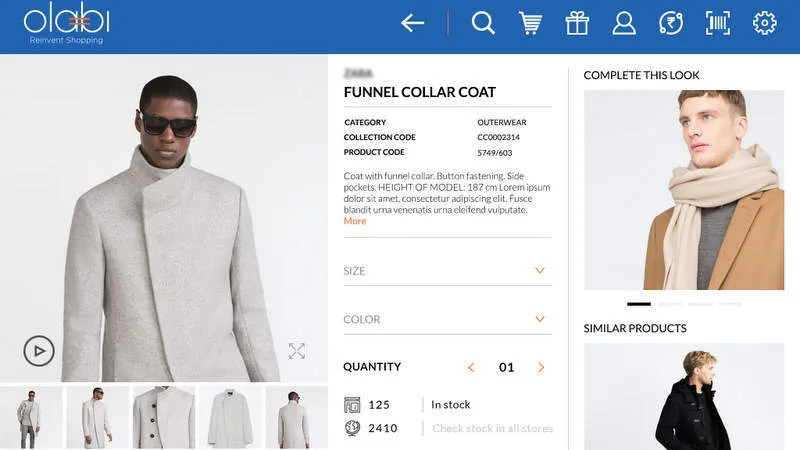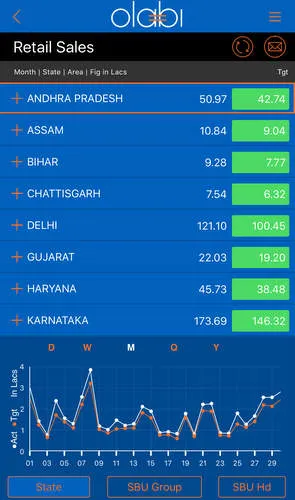Olabi, the retail me-commerce product that is enabling offline retail survive in an e-commerce era
It is the day and age when the e-commerce juggernaut is gathering pace rapidly, and engulfing all categories – even those that were thought to be amenable for offline purchasing in brick-and-mortar stores. It is not just the kirana stores that are fighting to stay relevant; even the large retail chains across sectors are feeling the heat and are looking for a weapon to stay relevant and continue to play an important role in the Indian consumer’s buying journey while of course growing the share of the customer’s wallet. Startups like Trade GINI and Bizom are trying to connect retailers to different distributors and manufacturers while most of the efforts are in the FMCG category.
Meet Olabi, founded by two retail veterans Sunil Kunders and Chetan Panchal, which is aiming to solve this enormous problem faced by modern retail chains. The team had created Voyager, a successful retail ERP software deployed at over 30 retail chains in India including reputed brands such as GAP, Aeropostale, Calvin Klein, USPA and Canon which has grown at a claimed ~55% growth year-on-year in the past 5 years. Olabi is their offering to try and disrupt the omni-channel retail landscape.
Challenges with offline retail
Imagine that you are running a retail chain of a few stores and would like to run a loyalty based promotional offer. You now have to deal with the vendor who manages the software used for store operations, the vendor whose software is being used for billing & customer info and maybe even the vendor whose software is used for inventory management. This multi-vendor dependency not only delays the program due to complexity but also makes it inefficient because of the lack of centralized data that can be leveraged efficiently to understand the customer at a granular level and serve her interests successfully.
In essence,
- Each store operates as a standalone entity with loose linkages with other stores
- Each store may or may not have access to the rest of the world or headquarters
- The in-store experience of the user suffers drastically due to this silo structure resulting in poor visibility, lack of real-time information and operational inefficiencies
However, the Indian customer has evolved rapidly over the past few years. She’s spoilt for choice and convenience – partly fueled by venture-funded e-commerce stores and partly enabled by genuine benefits that online buying provides. The typical consumer’s expectations have transcended the old-world problems brought on by the way legacy IT systems have operated till now.

Olabi, the Me-Commerce platform
Olabi from Mindscape has been designed to be a me-commerce platform, which can deliver true personalized experience to each consumer. It is a way to create a consumer segment of one, meeting and even anticipating the needs of each of your consumers. “The me-commerce manifesto is the core philosophy behind the product. If we align with the consumer, the rest is automatically taken care of. We are not fighting ecommerce – we believe that everybody can collaborate and ensure that the consumer benefits ultimately”, says Sunil. A consumer should ideally be able to take an iPad, walk around a store creating a cart that comprises of some physical products and some virtual products, choose different delivery addresses, get a discount based on their loyalty and pay seamlessly.
Sunil, who has been the CIO of Arvind Lifestyle Brands in the past, says “The product engineering has been done in a completely modular manner giving tremendous flexibility to our consumers. The engineering strategy has been to unlock features as required and as complexity of a retail chain increases. We have a 3-year product development roadmap where new features will be added every quarter to the four modules. Our retail chain customers can buy a base pack to set up and everything can be an add-on at a store level. For example, a chain may choose the complete package with iPad enabled service in their high-street store and retain just the basic version in a tier-2 town store”. It is a cloud hosted single platform that works in a SaaS model where payment can be per user, per day exactly as per usage.

Olabi currently has four modules:
- Retail operating system – contains all transactions, logistics, inventory, cashiering and a true omni-channel enabler. Also includes shop floor team management
- MeCommerce – provide a personalized shopping experience by enabling precision marketing. I-beacon technology is leveraged to recognize the customer and act accordingly
- Retail Economics – store based profitability analytics that can be leveraged for different use cases. For example, assisted profitability metrics which show the list of slow moving products which should be cleared out by using price drops or other promotion methods
- Retail Collective – open interfaces to connect the products from the retail ecosystem, such as a CRM, mobile wallet etc. where the retail chain just has to deal with Olabi and the relationships with the ecosystem players will be managed by them. This module is under development
The founders mention that the large retail chains have welcomed this product and are in discussions to figure out how to utilize the product within their IT shop. They expect the first set of customers on board in January 2016. Mindscape has been in business for about 25 years and has built legacy retail ERP called Voyager that is used by many large retailers. Sunil had worked not just as a software provider but also look at it from the lens of a CIO and closely understand where technology was failing these retail chains. Chetan too has been an ex-Arvind executive with experience in operations and finance.
So what prompted the two co-founders to move out of their comfort zone of a successful product? Says Sunil, “I believe it is important to disrupt yourself completely once every decade or risk becoming irrelevant. This product is not wrappers written around legacy code – it has been built from the ground up. It has taken us all of our industry knowledge and 18 months of development to build Olabi to its current state. I am sure our understanding of nuances will definitely be valued by our customers”

Our take
Offline retail technology has not been disrupted in many years now, with most large chains using fractured legacy IT systems. Many partial product suites are already in the market globally, but few are going the whole nine yards. The road ahead for a product like Olabi is exciting, if tough. The current team of nearly 70 people has to be trained to run a help desk, manage implementations and handle change management to support the new product and architecture. The organization has to move from the mindset of managing a monolithic legacy ERP to a nimble, modular, cloud-based, mobile-enabled system that has its own idiosyncrasies.
The focus is going to be on execution and delivering on the promises made during the sale. This has to happen while simultaneously deciding on how to sunset existing products and manage their support.
What do you think are the next big ideas that can disrupt offline retail? Share your comments!







